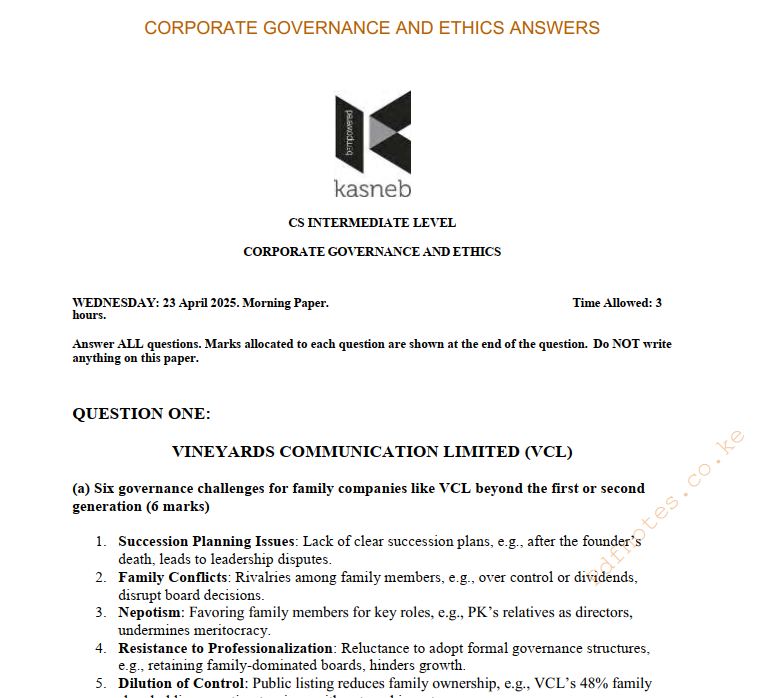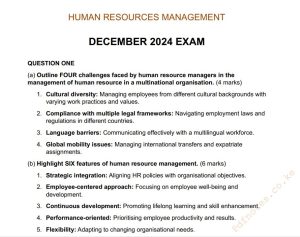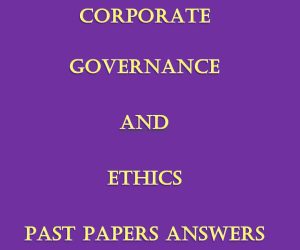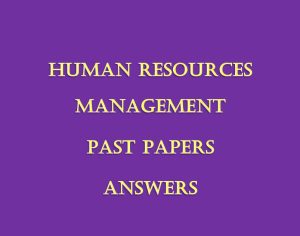Original price was: KSh300.KSh199Current price is: KSh199.
Download April 2025 Corporate Governance and Ethics Past Paper answers in Pdf form
Description
QUESTION ONE
VINEYARDS COMMUNICATION LIMITED (VCL)
Vineyards Communication Limited (VCL), is a family-owned hotel in Kenya and has been in operation initially in Nairobi for the past three decades. The company was established in 1990 with its first CEO being Patel Kumar (PK) the son of the founder, Imran Vishram. VCL however, has spread its footprint beyond Nairobi City County to major hospitality regions across Kenya, including Mombasa, Naivasha, Nanyuki and Kisumu. As a family-owned business, VCL’s board was heavily dominated by Vishram’s family. In May 2021, an independent director (ID) was voted out while two others resigned. The boardroom upheavals culminating to the resignations and removal of independent directors and revelations leading to such actions, was a poiner to VCL’s poor corporate governance practices and unfair remuneration policies.
VCL founder unfortunately passed away in June 2015 in a light aircraft accident. Under the leadership of Vishram’s son, PK, the private company was converted into a public company in April 2018 in order to access more capital both locally and in international financial markets. PK assumed the role of the Chairman of the company upon its conversion. He ensured that VCL was listed in the City Securities Exchange (CSE). The family continued to control the company even after the listing.
To diversify the family-controlled business, PK led the company to venture into tours and travel business as well as restaurant business specialising in Asian cuisine. VCL opened several specialty restaurants and a food court to supplement its operations in hospitality management.
In addition to being the chairman of VCL, PK continued to hold the position of Chief Executive Officer (CEO). The shareholding comprised of four children of Vishram, three daughters’ in-law of Vishram and four grandchildren. There were also two relatives of PK from his maternal side. In total, there were 13 shareholders directly or indirectly related to the Vishram’s family, collectively owning 48% of the shares of VCL. The rest of the shareholding was distributed as follows; Second Avenue Capital, an investment firm (26%), Voi Trust, a private trust (11%) and the rest 15% was distributed among a handful of high net worth individual investors. The company directly employed 237 people and indirectly about 2,000 service providers and agents.
At the beginning of year 2021, VCL had three independent directors (IDs) on the board. Simon Kessy, with a working experience of more than sixteen years in the banking industry, was appointed as an independent director on 7 June 2019 and a month later as VCL’s lead independent director. He served as the Chairman of the Audit Committee (AC) and a member of both the Remuneration Committee (RC) and Nominating Committee (NC). Simon held a Bachelor of Commerce degree from the University of Nairobi. He was also a member of the Institute of Accountants. Salim Yong joined as an independent director on 2 November 2020. He served as the Chairman of the Nominating Committee and a member of both the Audit Committee and Remuneration Committee. Salim held a Bachelor’s Degree in Business Administration from the National University of Rwanda. He had more than ten years of working experience in the hotel industry. The third independent director, Robert Kiilu was appointed on 4 July 2021. He served as the Chairman of the Remuneration Committee and a member of the Audit Committee. Robert held a Diploma in Hospitality from Utalii University. He had more than thirty years of working experience in the hospitality industry.
The VCL Board neither had a board calendar nor a work plan. Meetings were ad hoc and on a need basis. Board papers were not circulated in advance and agendas were as “tabled” during the board and committee meetings. In the financial year (FY) 2022, the directors had three board meetings, the Audit Committee had two meetings, while the Remuneration Committee and Nominating Committee met once. All directors on the board attended every committee meeting. The annual report and financial statements also indicated that management staff were invited to attend board and committee meetings whenever they were available and make contributions. Therefore, despite PK not being a member of the Audit Committee and Remuneration Committee, he participated in all Audit Committee and Remuneration Committee meetings throughout the year.
Apart from the three Independent Directors, VCL’s board had three other directors who were related family members. These directors wielded a lot of influence. PK, the Chairman and CEO, had a Bachelor’s Degree in Commerce from the University of Southern Cape. He was also a member of the Institute of Accountants. Before joining his father’s enterprise, he worked with a number of local and international audit firms. PK’s responsibilities as Chairman included overseeing and spearheading the direction and development of the company. His duties as CEO involved extensive involvement in the company’s corporate developments, such as the transformation of VCL into a fully-fledged hotel chain and the company’s entry into the larger East African market.
Another executive director (ED), Singh Amrita, PK’s sister, held a Bachelor’s Degree in Business Management from a University in Western Kenya. She was also a member of the Institute of Accountants. In 2020, Amrita, joined the company as a Company Secretary and four years later, she became a director. Amrita was primarily responsible for the company’s corporate affairs such as finance, treasury, company secretarial matters, human resource and administration.
Deepak Khan had served as an executive director of VCL since 2018. He was a brother-in-law of PK. Deepak was a member of the Audit Committee and Remuneration Committee. He held a Bachelor’s Degree in Accountancy from New Oxford University and was a fellow of the Institute of Accountants.
On 26 March, 2024, VCL convened its Annual General Meeting (AGM), during which shareholders cast their votes on the re-election of Robert Kiilu as an independent director and as Chairman of the Remuneration Committee. However, the ordinary resolution to re-elect Robert was rejected by shareholders, with 80% voting against. Consequently, Robert retired at the conclusion of the AGM. On the same day, VCL announced the cessation of Robert as a company’s Independent Director. Robert had voted “yes” on the question as to whether there were any unresolved differences in opinion on material matters between the person and the board of directors. He had earlier informed the meeting that there were outstanding material issues before the Remuneration Committee which were being investigated and yet to be resolved. During the AGM, it became apparent that there were huge disparities in the remuneration of directors even when they were playing similar roles. Directors related to PK were earning more than three times of what those who were perceived as outsiders earned.
Two months prior to the AGM, on 28 January 2024, Simon, who was then the lead Independent Director of VCL, announced his resignation from the board, effective one day after the AGM. He cited “preoccupations and personal reasons” for his resignation. With Roberts’s removal from the board, VCL would be left with only one Independent Director after the AGM. Consequently, VCL failed to comply with City Security Exchange rules which required at least two Independent Directors. A provision of Code of Corporate Governance recommended that independent directors make up a majority of the board where the Chairman is not independent. Patel also highlighted that Salim, the remaining Independent Director, had also expressed his intention to step down from the board and Amrita, had written a letter to the Board Chair on her intention to step down as the company secretary at VCL.
Towards the end of year 2024, VCL indicated in its regulatory filings that it lacked the requisite number of Independent Directors among other governance lapses such as a vacancy in the position of the Company Secretary.
Required:
(a) Explain SIX governance challenges that family companies like VCL are likely to face as they move beyond the first or second generation. (6 marks)
(b) Discuss FIVE poor governance practices at VCL that affected the effectiveness of its Board. (10 marks)
(c) Examine SIX reasons why independent directors were important in the corporate governance of VCL, being a family owned business. (12 marks)
(d) Analyse SIX good board governance practices that VCL could adopt to improve corporate governance. (12 marks)
(Total: 40 marks)
QUESTION TWO
(a) Explain FIVE benefits of self-regulation in corporate governance. (5 marks)
(b) Boards establish and approve formal and transparent remuneration policies and procedures that attract and retain board members.
Analyse FIVE guidelines for remuneration of board members according to the Code of Corporate Governance Practices for Issuers of Securities to the Public, 2015. (10 marks) (Total: 15 marks)
QUESTION THREE
(a) Summarise FIVE functions of an external audit to an organisation. (5 marks)
(b) Discuss FIVE ways in which an organisation could make a whistleblower policy more effective. (10 marks)
(Total: 15 marks)
QUESTION FOUR
(a) Explain FIVE differences between the American model of corporate governance and Japanese model of corporate governance. (5 marks)
(b) Examine FIVE salient features of a consensus board model. (10 marks)
(Total: 15 marks)
QUESTION FIVE
(a) Summarise FIVE contents of the Articles of Association of a company. (5 marks)
(b) Explain FIVE factors that organisations should put in place to ensure effectiveness of codes of ethics. (5 marks)
(c) Highlight FIVE reasons why organisations should carry out activities aimed at protecting the environment. (5 marks)
(Total: 15 marks)
………………………………………………………………………………….




